Radicals hold on to second cabinet seat

The election of Didier Burkhalter to the cabinet has confirmed the status quo in the Swiss system, which is based on power-sharing and consensus politics.
The embattled centre-right Radical in the end succeeded comfortably in fending off a challenge by the rival Christian Democrats for a second seat in the seven-member government.
It took four rounds of voting in a joint session of the House of Representatives and the Senate before the senator from the French-speaking canton of Neuchâtel won the necessary majority. He beat the Fribourg senator Urs Schwaller with a margin of more than 20 votes.
Parliament needed just over two hours on Wednesday to choose the 112th cabinet member in modern Swiss history. But the thrill had already evaporated 20 minutes before the final vote when it became clear that the tactics of the Radical Party and the rightwing Swiss People’s Party would be successful.
Even before the announcement of the winner there was a sense of relief and quiet satisfaction among those who supported Burkhalter, or sought to stop Schwaller.
Disappointment was written on the faces of the defeated challengers. The Christian Democrats blamed the centre-left for Schwaller’s loss but said the result was to be expected.
The Social Democrats for their part regretted that the Christian Democratic candidate was not able to offer more political concessions, and downplayed the election of Burkhalter, saying it would not change the course of Swiss politics.
Power-sharing
The key words used to explain the vote outcome that were repeated by politicians and political scientists alike throughout the day, were that of power-sharing and consensus.
And Burkhalter mentioned them in his acceptance speech, in the countless interviews to the media and during his first official news conference as elected member of the government.
“The election – the result and the way it passed off – has given a boost to the unity of the country in all its cultural diversity,” Burkhalter said.
He stressed the importance of a fair representation of the different language groups and regions for the cohesion of the country and for the involvement of the citizens in politics. Burkhalter hails from a French-speaking region – one of three minority groups besides the German-language majority.
The traditional method of allocating the seven cabinet seats among the four main parties had been undermined with the rise of the rightwing People’s Party under their strongman Christoph Blocher over the past few years.
Pragmatism
Political scientist Mark Balsiger sees Wednesday’s election as a typical form of Swiss pragmatism.
“It shows that there is no willingness to change the long-standing formula,” he said.
He added that strategic and personal issues were crucial for the parties to decide which candidate to back, not least with a view to 2011 when the next election for the entire cabinet is due.
Switzerland is not ready for a change in the governing system, according to Balsiger.
“A majority in this country still believes in the country’s unique political system, even if it lost some of its shine over the past 161 years.”
But he says the media has been pushing for a more confrontational style of Swiss politics, including a shift towards a system of government and opposition.
He notes that most political parties have been neglecting their responsibility to build up potential government candidates which would allow them to present credible alternatives to set up a challenge.
High and light
Cabinet elections are said to be a highlight of the Swiss parliament. An unusual number of journalists with their cameras, microphones and notepads as well as visitors in smart clothes squeeze past each other in the corridors outside the chambers.
While the new cabinet member was doing the rounds of the radio and television stations a crowd had gathered on parliament square to wait for him to walk through the entrance for a handshake or a quick word.
It is a familiar sight. But the skies over Bern did little to make it a glorious moment. The thick stratus clouds of the morning refused to go away, and the scene at midday had a milky-grey hue. The perfect colour to describe the 49-year old politician, critics might say.
Indeed, Burkhalter showed no emotion in public. He chose his words carefully during the first official news conference, but left no doubt that he is ready to face his new task, most likely as interior minister.
Urs Geiser, swissinfo.ch (with input from Armando Mombelli)

More
Consensus politics and power-sharing
The multi-party cabinet consists of seven ministers with equal powers.
Cabinet decisions are taken collectively and on the basis of consensus, but it is not a coalition government.
The Radicals, the founders of modern-day Switzerland in 1848, hold two seats, as do the centre-left Social Democrats.
The second major centre-right party, the Christian Democrats, lost their second seat in 2003 to the rightwing Swiss People’s Party, ending nearly 50 years of an unchanged party-political makeup of the cabinet.
The People’s Party temporarily gave up both its seats in 2007, but it took back one seat last year.
The newly-created Conservative Democratic Party currently also has one seat.
Didier Burkhalter, 49, is an economist and member of the Radical Party.
He comes from the French-speaking canton of Neuchâtel, which he has represented in the Senate since 2007.
He sat in the House of Representatives from 2003 to 2007. At his election to the Neuchâtel city council in 1991, he became one of the youngest Swiss politicians to take on an executive function. He left the council in 2005.
In 2005 his mediation skills led to him being named the vice-chairman of the Radicals in the House of Representatives.
During his time in the Senate, he was behind an initiative for a national alert system for the abduction of children.
Although he delivered his acceptance speech in French, Burkhalter promised to also express himself in Italian, German and Romansh in the future.
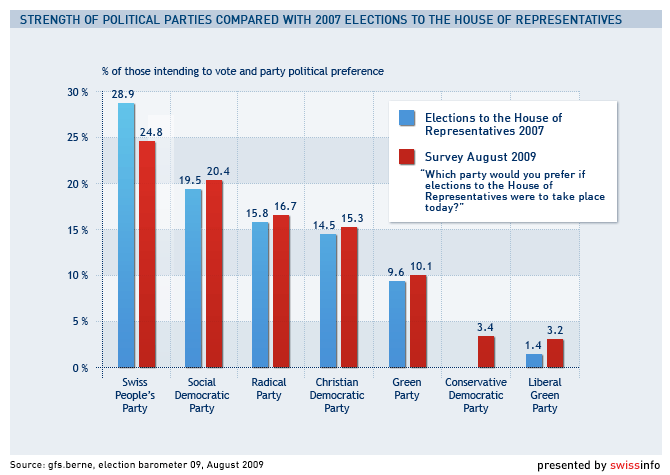

In compliance with the JTI standards
More: SWI swissinfo.ch certified by the Journalism Trust Initiative










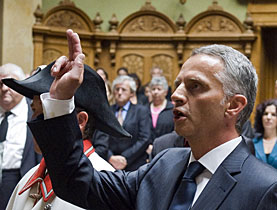
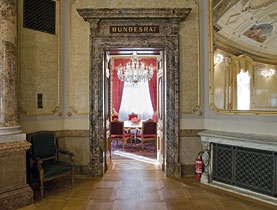
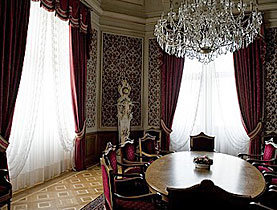
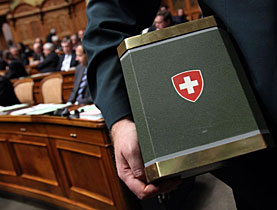

You can find an overview of ongoing debates with our journalists here . Please join us!
If you want to start a conversation about a topic raised in this article or want to report factual errors, email us at english@swissinfo.ch.